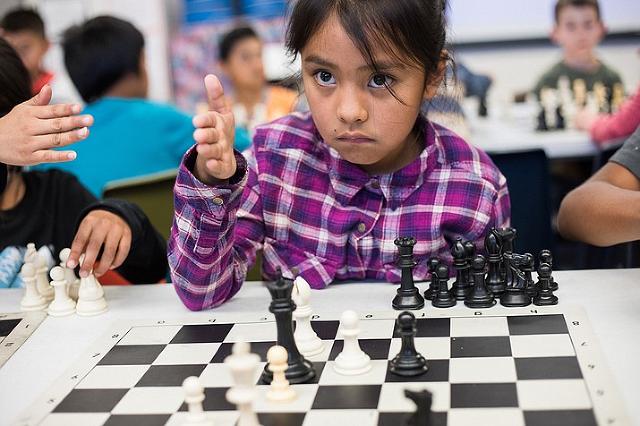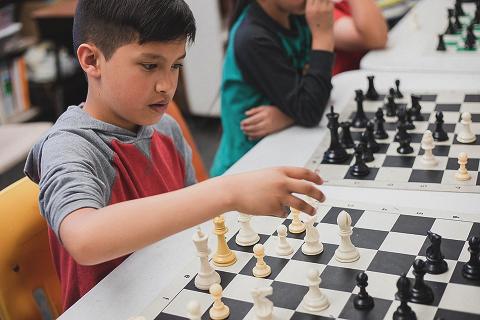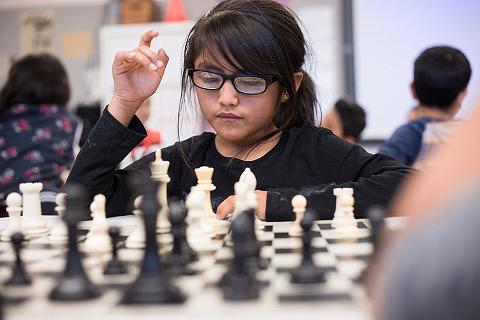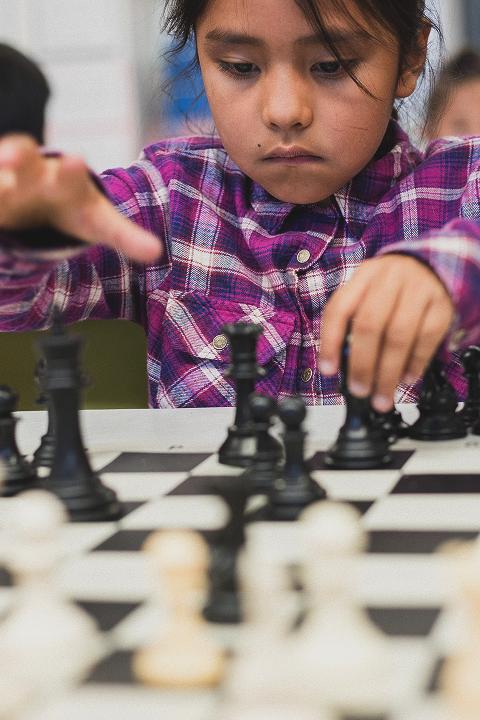 |
Canku Ota
|
 |
|
(Many Paths)
|
||
|
An Online Newsletter
Celebrating Native America
|
||
|
April 2017 - Volume
15 Number 4
|
||
|
|
||
|
Killip Elementary
School's Chess Challenge
|
||
|
by Katherine Locke -
Navajo-Hopi Observer
|
||
|
Killip Chess Team
needs $5,000 for students to attend national chess competition in
Tennessee
FLAGSTAFF, AZ — About thirty-five students from Killip Elementary Chess Team in Flagstaff have qualified to go to Super Nationals in Nashville, Tennessee May 11-15. The only thing holding some of the students back from being able to go is money. Five thousand participants are expected at the tournament in Nashville, which occurs once every four years. The last time Killip could afford to send a team to the competition, the students placed third in the nation. By spring break, Ted Komada, who runs the chess program at Killip, was about $5,000 short of what he needs to bring all the kids who qualified to nationals, which comes to about seven students at $775 each, which includes a $50 registration fee. Komada has set up a gofundme account at https://www.gofundme.com/KillipChesstoNashville where people can donate any amount to the team they would like to. He said the chess team usually raises their own funds for most tournaments and they do not rely on people walking up and handing over money. However, the expense of sending kids this year proved difficult, but also made him realize how community oriented the Sunnyside neighborhood is.
People can also donate by using the Arizona tax credit for schools in any amount, though the tax credit is $200 for an individual or $400 for a couple. The donation can be earmarked for Killip chess or in the name of a particular student on the memo line of the check, or if people donate online, in the description field. "It was a little rough to say we're in this situation and we're going to have to do [ask for money]," Komada said. "But the response through the tax credit and GoFundMe account has been excellent. Not just getting the money and being able to send more kids with it, but the affirmation and a reflection of how we stand in the community, the support that has come out. That was good stuff." To qualify, students go through several rounds of rankings. Komada assesses how committed to the program students are: do they come to the meetings and practices? Students work Monday — Thursday after school to learn how to compete against each other and other competitors. Komada also looks at student's chess ratings, which is a number they get at tournaments that pairs them based on the strength of their opponents. "Once you get a rating, your goal is to try and raise that number as high as you can," Komada said. While that number is not always accurate, especially for the newer players because it takes a while for new players sometimes to get comfortable in a tournament setting, Komada said it is still one of the ways he evaluates players.
He also internally ranks the students on their ability against each other —basically, if he puts two students together to play, who does he think will win against each other. Students also get points for tournament experience. "I work my way down the list, and they work their way up the list," Komada said. "It's a constant battle because they all want to go. I won't be able to send them all. And I also say, not all of them are ready. There's a group of players who, as much as they are working for it, this is their first year, they joined a few months ago, they're just not ready to go to a national tournament." In the years Komada has spent teaching the kids to play chess, and even in his own play, he has realized there is a big differences between playing chess and moving pieces on the board. Most people move pieces. "There's a step to take before you're a chess player," Komada said. That is what he tries to teach the kids. At its peak ,the chess team had about 100 kids practicing every day. Now they have about 50-60. Komada's goal for the program is to serve as many kids as possible. And the competitive chess team does pretty well in tournaments. "We struggled for a long time with this notion of, do we play chess and have fun because we want to hang out after school or are we going to be a competitive chess team and go out there and try and find some hardware," Komada said.
Komada said he and the others coaches who run the program went back and forth on that question because if they pushed the students, then are the kids really getting what they came to the program for. "But with the capacity and ability for a big chunk of us to be competitive and be good," Komada said. "What we finally settled on is we find our fun in the work it takes to become a better player. It is out of that drive that we're all, the coaches and the kids, driven to improve." Komada said there is more than one way to teach chess. He said there is a notion that teaching the openings and having the kids memorize where to put the pieces and how to move them is one way. But that limits the kids to 10 or 15 moves, and then the memorization does not help anymore. "The other side of the coin is, forget the memorization of all of this stuff and play these concepts: don't lose your piece, don't give away more points than you are getting," Komada said. "So they learn this set of concepts to apply to the board. We teach kids to think from the very first move of the game." The concept involves the kids thinking about and calculating multiple moves ahead in the game, which includes seeing the whole board and evaluating what each move gets a player in terms of the whole game, instead of just one move. "If I had a way of teaching kids to go farther in their calculations, we'd be a better chess team," Komada said. "It's a really hard thing to teach." Komada encourages people to follow Killip Chess on Facebook. "Whether people donate or not, we're proud of who we are and what we do," Komada said. "We want to share. We're constantly posting updates and tournaments and the event itself. It is good to have people following along." He shares with kids on the trip, that while they know the Arizona students who play chess, they do not know most of the other teams. "But [I tell the kids], back home you've got thousands of people watching every single day just waiting for that next little bit to come in," Komada said. "That's a good connection to home and family for those who can and can't go." |
|||||
|
|
|
|
||
|
|
||
| Canku Ota is a free Newsletter celebrating Native America, its traditions and accomplishments . We do not provide subscriber or visitor names to anyone. Some articles presented in Canku Ota may contain copyright material. We have received appropriate permissions for republishing any articles. Material appearing here is distributed without profit or monetary gain to those who have expressed an interest. This is in accordance with Title 17 U.S.C. Section 107. | ||
|
Canku Ota is a copyright ©
2000 - 2017 of Vicki Williams Barry and Paul Barry.
|
||
 |
 |
|
|
The "Canku
Ota - A Newsletter Celebrating Native America" web site and
its design is the
|
||
|
Copyright ©
1999 - 2017 of Paul C. Barry.
|
||
|
All Rights Reserved.
|
||



